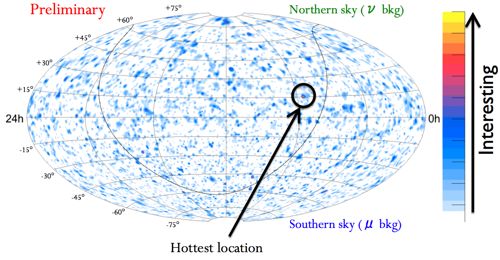The nature of the work being done for IceCube down here at the South Pole is not really research - the research in general is done at the 30 or so partner institutions around the world, based on the data collected by IceCube. We are working hard to get the sensors deployed into the ice to allow us to gather that data. I have focused my journals on how those sensors get deployed, and how this array is supposed to detect neutrinos. But what do we do with that information?
First off, a brief note about the data already gathered. The first strings of the IceCube detector and first tanks of the IceTop array were placed in the ice in early 2005. Since then, each year more strings and tanks have been deployed. But even though the entire telescope will not be finished until 2011, we are still able to use the partial telescope to gather data! Every day, neutrino events are detected in the strings already in the ice, and every day we get more DOMs on line and ready to collect even more data.
IceCube is specifically looking for neutrinos from high energy cosmic events "out there" - black hole formations, supernovas, etc. But the data gathered so far is inconclusive. Thousands of neutrinos have been detected, but the majority of them are created in our own atmosphere by cosmic ray collisions. This creates a background of "noise" kind of like static on a radio. This noise is pretty evenly scattered across the sky, and doesn't really tell us what we want to know.
 Neutrinos detected across the sky by IceCube (when the array was only half complete). So far we see random neutrinos probably created in the atmosphere, creating background noise. Even the "hottest location" is statistically just random luck - like flipping a coin and getting heads 4 times in a row. As more data is gathered, we can be more certain about "interesting" point sources of neutrinos.
Neutrinos detected across the sky by IceCube (when the array was only half complete). So far we see random neutrinos probably created in the atmosphere, creating background noise. Even the "hottest location" is statistically just random luck - like flipping a coin and getting heads 4 times in a row. As more data is gathered, we can be more certain about "interesting" point sources of neutrinos.
Scientists are looking for any point-sources in the sky, perhaps a star that is about to go supernova, or a black hole that is just about to form, where there are more neutrinos than the average background noise. They would call this a "signal." They hope to find points in the sky where the ratio of "signal" to "noise" is very high - spots where there are so many neutrinos you can't confuse it with the background static. Think of tuning an old radio - some channels are just static hiss; some might get little blips of sound that you think are a song but you can't be sure; but some are nice clear songs that drown out any background static. That last one has a very high signal (song) to noise (static) ratio, which is what we hope to find.
So far, however, we have not collected enough data for scientists to be very confident about the signal to noise ratio, so they can not say for sure that any of the neutrinos they have detected are the ones from cosmic events.
As time goes on, and as the IceCube telescope gets finished, we will be able to gather more and better data, and we will be able to filter out the background noise in order to better detect those point-sources we are seeking. The IceCube telescope is expected to gather data for at least 20 years, and as that time passes, our data will get better and better and we will find more and more point-sources of neutrinos that can tell us about our universe.
So how does this research help the average person? Can we use neutrinos to cure cancer? Can we use neutrinos to feed the poor and hungry, or to end war? Can we use neutrinos to make your cell phone battery last longer? nope. No one has any inventions based on neutrinos, and it's not likely they will any time soon.
In science, often the entire point is just the process of discovery, of learning a bit more about our planet, our solar system, our galaxy, our universe. If we can understand neutrinos, and the information they bring to us from the depths of the universe, perhaps we can learn more about the Big Bang, or about the life of stars, or about how black holes are created. While perhaps this knowledge won't make you richer or thinner or better looking, it is just plain interesting and cool to learn about - and as far as I am concerned, that's reason enough to pursue this or any kind of knowledge.

